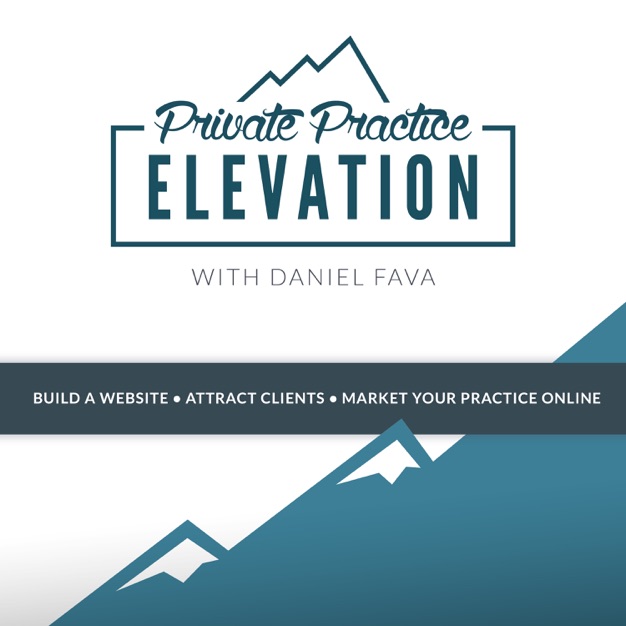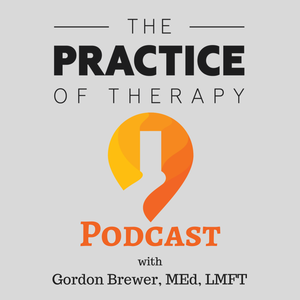
Private Practice Elevation with Daniel Fava
Daniel Fava of Create My Therapist Website
Daniel Fava from Create My Therapist Website is on a quest to uncover the best website and online marketing strategies so you can grow a successful private practice and do the work you love. Discover how you can build an effective website for your therapy practice, attract the right clients through content marketing and blogging tips, develop passive streams of income and attract more of your ideal clients just by being your amazing self. Other topics for discussion include SEO (search engine optimization) for private practice, finding your niche, website design, conversion tactics, outsourcing and more to help you create an impact and grow your income with your therapy, counseling, healing or physical therapy business.
- 34 minutes 15 seconds179. More Impact, Less Burnout: How Therapy Intensives Can Revitalize Your Practice with Steffeny Feld
In this episode of the Private Practice Elevation podcast, we’re diving into the world of therapy intensives with Steffeny Feld, EMDR Certified Therapist, Consultant, and Creator of the Intensive Design Lab.
Steffeny is passionate about helping therapists transform their practices by offering therapy intensives—an approach that’s not only deeply impactful for clients but also allows clinicians to work less, earn more, and make a lasting difference.
During our conversation, Steffeny shares her journey, the benefits of therapy intensives, and practical steps for incorporating them into your private practice.
We’ll explore what makes therapy intensives so powerful, common misconceptions therapists might have, and how they can help you grow your income, boost your energy, and expand your impact.
Whether you’re new to the concept or curious about taking the next step, this episode is packed with actionable insights to help you reimagine your private practice.
Key Takeaways:-
Therapy Intensives Defined: Therapy intensives are extended sessions ranging from two to eight hours, offering a deep dive into therapy work over a few consecutive days, providing significant transformational benefits.
-
Transition to Intensives: Therapists can start integrating intensives by experimenting with current clients, choosing time slots that suit both parties, and setting a price reflective of the enhanced focus and outcomes.
-
Expanding Therapeutic Practice: Intensives offer therapists an opportunity to reduce client loads while maintaining income, offering a path to prevent burnout and enhance professional fulfillment.
-
Marketing Insights: The intensive model can be marketed effectively by addressing specific client needs, using terms like "intensive" or "therapeutic retreat," and highlighting distinctive benefits to attract clients.
-
Community and Resources: Steffeny’s Intensive Design Lab and related Facebook group provide valuable support and resources for therapists looking to explore the intensive therapy model.
4 February 2025, 1:26 am -
- 21 minutes 39 secondsBonus Episode: SEO Webinar This Week!27 January 2025, 1:00 pm
- 32 minutes 59 seconds178. The Top 5 Accounting Mistakes Therapists Make with Julie Herres
In this episode, we’re talking about the financial mistakes that therapists often make in private practice—and how to avoid them.
Whether you’re just starting out or scaling your business, this conversation will help you manage your finances more effectively, save money, and reduce stress.
Our guest, Julie Herres, CEO of Green Oak Accounting and an experienced accountant who works with private practice owners, shares practical advice to help you feel confident about your numbers and make smarter financial decisions.
If you’ve ever worried about tax surprises, felt unsure about when to hire a professional, or struggled to make your practice profitable, this episode is for you.
What You’ll Learn in This Episode:-
Why saving for taxes is essential and how to avoid year-end financial panic.
-
The key mindset shift you need to treat your practice as a successful business.
-
How skipping professional help for accounting or legal advice can cost you big in the long run.
-
Simple strategies, like Profit First, to allocate your income and keep your practice financially secure.
-
Tips for scaling your practice while staying on budget and avoiding common pitfalls.
-
Prepare for taxes: Set aside money regularly to avoid unpleasant surprises during tax season.
-
Adopt a business mindset: Treat your therapy practice as a business to ensure its long-term success and impact.
-
Get expert help: Hiring professionals for accounting and legal needs can save you time, money, and headaches.
-
Plan ahead: Consult with experts before making significant business changes to avoid costly mistakes.
-
Profit First strategies: Use intentional income allocation to maintain financial stability and growth.
Tune in to learn how to avoid common financial pitfalls and build a thriving, profitable private practice.
Links mentioned in this episode:21 January 2025, 2:47 pm -
- 33 minutes 14 seconds177. How To Perform an SEO Assessment of Your Private Practice Website
In this episode of Private Practice Elevation, Daniel dives into the world of search engine optimization (SEO). He explains how therapists in private practice can perform a basic SEO assessment of their websites.
SEO can feel like a moving target, especially with the constant changes in Google's algorithm, but understanding the basics can make a big difference in your online visibility.
For private practice owners, having a strong online presence is essential to attracting the right clients. However, navigating SEO often feels overwhelming.
That’s why this episode is packed with practical tips to help therapists assess their current SEO strategies and identify opportunities for improvement.
From understanding key metrics in Google Analytics to optimizing Google Business Profiles for local search, Daniel covers the essentials to help you elevate your online presence and grow your practice.
Why Perform An SEO Assessment?Many therapists struggle to understand why their website isn’t generating enough leads or why they aren’t ranking higher in Google searches. Daniel emphasizes that an effective SEO strategy starts with understanding where your website stands today.
By assessing your current performance, you can create a clear path toward improving your rankings, driving more traffic, and ultimately attracting more of the clients you want to work with.
Episode Highlights-
0:01 – Boosting Private Practice Growth Through Effective SEO Strategies Daniel begins by discussing how SEO is a powerful tool for growing your practice and why it’s worth the investment.
-
3:35 – Join Our SEO Basecamp Live Training Group for Private Practices Learn about a new training program designed specifically to help therapists gain a deeper understanding of SEO.
-
7:49 – Understanding SEO Baselines and the Importance of Google Analytics Daniel explains the importance of setting a baseline for your SEO performance and tracking critical metrics like website traffic and bounce rates.
-
10:41 – Essential Tools and Strategies for Effective SEO Management Discover some of the must-have tools, including Google Search Console and Ubersuggest, to assess and manage your website’s SEO.
-
16:18 – Mastering SEO: From Technical Aspects to Content Strategy A step-by-step guide to addressing technical SEO, from fixing broken links to improving website speed.
-
22:27 – Optimizing Website Content and Structure for Better SEO Tips for improving your site’s navigation and creating service-specific content that resonates with potential clients.
-
26:29 – Optimizing Google Business Profiles for Enhanced Local SEO Daniel shares actionable advice on improving local SEO by enhancing your Google Business Profile and collecting reviews.
-
29:43 – Elevate Your Practice With SEO Strategies and Alma Support Wrapping up with how Alma, an SEO agency, can support therapists in taking their SEO to the next level.
-
SEO Assessments are Crucial: Regular assessments reveal your website’s strengths and areas for growth, setting the stage for improvement.
-
Optimization Tools are the Foundation: Tools like Google Analytics, Google Search Console, and Ubersuggest provide invaluable data for guiding your strategy.
-
Four Mountains of SEO: Daniel highlights technical SEO, on-site optimization, content creation, and off-site strategies as essential pillars.
-
Content is King: Quality, client-centered content positions your site as a trustworthy resource and boosts rankings.
-
Local SEO is Key for Growth: Optimizing your Google Business Profile and gathering reviews can drastically improve your visibility in local searches.
7 January 2025, 12:27 am -
- 28 minutes 21 seconds176. Our Top Predictions for SEO in 2025: What Therapists Need to Know
In this episode of the Private Practice Elevation Podcast, Daniel dives into the fast-paced, ever-evolving world of SEO and what therapists can expect as we look toward 2025.
With Google’s algorithms constantly shifting and new technology—like AI-powered search engines—coming into play, keeping up with SEO trends can feel overwhelming for private practice owners. However, understanding these changes is essential for staying visible online and continuing to attract new clients.
For many therapists, the world of SEO can feel like a maze of ever-changing rules and best practices.
Google’s algorithms now analyze everything from page load times to user experience and even the expertise of content authors. This means that simply having a website or using a few targeted keywords is no longer enough to achieve high rankings.
Staying on top of SEO requires not only understanding what Google’s search engine is prioritizing but also adapting content and website strategies to match those priorities.
In this episode, we’ll cover five major SEO trends predicted to dominate 2025.
Each prediction is meant to help you reach more of your ideal clients and understand the shifting landscape of SEO for your private practice. With clear explanations and straightforward action steps, you can learn what’s coming next—and what you can do to stay ahead.
Key Takeaways:-
AI in SEO: AI-powered search engines are set to revolutionize SEO strategies in 2025, demanding conversational and precise content in addressing user queries.
-
Search Intent over Keywords: Emphasizing the importance of understanding and responding to search intent, rather than focusing solely on keywords, for enhanced user engagement.
-
Visual and Interactive Content: Incorporating engaging visual and interactive content, such as videos and images, into websites to better captivate audiences and improve search rankings.
-
Voice Search Optimization: Adapting for voice search use by making content more conversational and ensuring websites are mobile-friendly to capture on-the-go users.
-
E-A-T Principle: Strengthening the trustworthiness and authority of content through consistent, high-quality, expert-backed articles and displaying credentials effectively on websites.
23 December 2024, 3:39 pm -
- 33 minutes 9 seconds175. 5 Steps to Optimize Your Blog Posts for SEO
In this episode of Private Practice Elevation, we're diving into one of the most important yet often misunderstood aspects of online marketing: blog SEO.
You’ll learn five actionable steps to optimize your blog posts for search engines, helping you rank higher in search results and reach more potential clients.
Whether you’re just starting out with blogging or you’ve been at it for a while, this episode will give you clear, easy-to-follow strategies for improving your blog’s visibility without getting overwhelmed by technical jargon.
From keyword research to writing compelling titles to structuring your posts for better readability, we’ve got you covered.
Many private practice owners and therapists struggle with getting their content seen by the right people. You might be writing fantastic blog posts, but if those posts aren’t optimized for search engines, they’re likely not reaching your target audience.
This can lead to frustration as you’re putting in the effort but not seeing the results. The issue often comes down to a lack of SEO knowledge, which can feel daunting to non-tech-savvy practice owners. This episode will simplify SEO, breaking down exactly what you need to do to make your content more discoverable online, so you can focus on attracting more clients.
One common myth is that SEO is too complicated for non-experts.
Many therapists believe they need to hire an expensive marketing agency to see any real results. While it’s true that SEO can get technical, the steps covered in this episode are straightforward and something you can easily implement on your own. We’ll also address the misconception that stuffing your blog post with keywords is the key to ranking higher. With Google’s August 2024 update, focusing solely on keywords is no longer enough—intent and relevance are what matter most now.
Finally, we’ll bust the myth that SEO success happens overnight. While these steps are crucial, it’s important to understand that SEO is a long game. Consistency and quality will pay off, helping you grow your practice over time by bringing in more organic traffic.
Tune in to this episode and take the mystery out of blog SEO with five simple steps to make your content work harder for your practice!
Key Takeaways-
Keyword Research is Fundamental: Understanding the search intent and using natural language processing can significantly enhance your blog content's relevance and ranking.
-
Compelling Titles and Meta Descriptions: Create engaging and informative titles and meta descriptions that include primary keywords to boost click-through rates.
-
Optimized URLs: Short, clean URLs that incorporate primary keywords improve both user experience and search engine understanding.
-
Utilizing Headers and Subheadings: Organize content with a hierarchy of headers to facilitate better user experience and search engine indexing.
-
Linking Strategy: Incorporate relevant internal and external links to guide users and establish authority, increasing engagement on your site.
10 December 2024, 1:28 am -
- 45 minutes 16 seconds174. Embracing the Digital Revolution in Mental Health: What Therapists Need to Know with Amity Cooper
In this episode, Daniel Fava addresses a common concern many therapists have—technology.
It's no secret that a lot of therapists shy away from new digital tools, whether it’s due to fear of change, lack of time to learn, or simply feeling like technology doesn’t fit into their practice. But what if embracing tech could make therapy more efficient, engaging, and accessible?
Daniel chats with Amity Cooper to explore this, who shares her insights on how therapists can leverage technology like AI and virtual reality to enhance their work and improve client care.
Amity is a professional counselor with a diverse background in business and mental health. Holding dual master's degrees in Clinical Mental Health Counseling and Conflict Resolutions, she has traversed a career path from marketing and product development to the mental health field.
Her entrepreneurial background has not only given her a fresh perspective on therapy but also led her to coin the term "Therapreneur," which describes therapists who embrace both clinical work and entrepreneurship.
Throughout the episode, Amity shares how therapists can benefit from thinking like business owners while still delivering high-quality care to clients. She believes that combining therapeutic expertise with smart business practices can help therapists run thriving, sustainable practices.
But the conversation doesn't stop there! Amity and Daniel dive into some cutting-edge topics like AI (artificial intelligence) and VR (virtual reality) and how these technologies are starting to transform the therapy space.
While technology can feel intimidating to some, Amity encourages therapists to push past their fears and embrace the future. Whether it's using AI-powered chatbots or note-taking tools that simplify admin work or introducing clients to VR experiences that create immersive therapeutic environments, there's a lot of potential for these tools to elevate therapy practices.
This conversation will help you shift your mindset and see how integrating these tools can empower both you and your practice.
Key Takeaways:-
Innovation in Therapy: Amity Cooper wants therapists to think beyond the therapy room and adopt a "Therapreneur" mindset. By blending therapy skills with business know-how, therapists can build successful and innovative practices.
-
AI as a Co-Pilot: AI isn't something to be afraid of! Amity talks about tools like ChatGPT and Decipher AI, which can help therapists manage their workload by automating tasks like writing, engaging with clients, and even creating content for blogs or social media. This frees up time for therapists to focus on what matters most—helping clients.
-
The Power of VR: Imagine being able to take your clients into a fully immersive environment where they can safely confront their fears or practice new skills in a controlled space. That's the power of virtual reality in therapy, and it's opening up new possibilities for enhancing client experiences.
-
Bridging the Tech Gap: The mental health industry has been slow to adopt new technologies, and Amity believes it's crucial to close that gap. By staying current with tech advances, therapists can improve their services and meet clients' evolving needs.
-
Empowering the Profession: One of the biggest takeaways from this conversation is that therapists should be part of the technological revolution in mental health. If clinicians don’t embrace these changes, there’s a risk that tech companies might take the lead and leave therapists out of the equation. Amity’s message is clear—therapists need to be involved in shaping the future of their field.
Links mentioned in this episode:22 November 2024, 8:44 pm -
- 24 minutes 30 seconds173. How Google's Core Update Could Impact Your SEO Strategy
In this episode of the Private Practice Elevation podcast, we delve into the significant recent changes in the SEO landscape due to Google's latest core update.
If you've relied heavily on optimizing for specific keywords or building backlinks, sorry, but it's time to reevaluate your strategy. Google's new focus pivots towards content that is genuinely useful, relevant, and expertly crafted to serve users' needs.
Understanding these shifts is crucial for private practice owners aiming to maintain or improve their website rankings.
Daniel provides an in-depth look at how these updates could affect your SEO efforts and offers expert advice on adapting to these changes.
By emphasizing the importance of creating high-quality, relevant content and a seamless user experience, he guides listeners through what it takes to stay ahead in the evolving SEO game.
Key Takeaways:-
Relevance Over Keywords: Google's algorithm now prioritizes understanding the user's intent and providing relevant answers over just matching keywords.
-
Helpful Content: Your website content must come from a place of authority and offer genuine solutions to users' problems to be considered valuable.
-
User Experience: How fast your site loads and how easily users can navigate it play a critical role in maintaining good SEO rankings.
-
AI Content: While AI-generated content is acceptable, it must be thoroughly fact-checked and enhanced with your expertise to be effective.
-
Adapting to Changes: Regularly reviewing and updating your content to ensure it remains relevant and valuable is crucial for dealing with fluctuations in SEO rankings.
-
148. What Therapists Need to Know About AI w/ Rebekah Hudson
-
How Does Google’s Helpful Content Update Impact SEO? - Neil Patel article
8 November 2024, 10:13 pm -
- 16 minutes 4 seconds172. The Hidden Risk of Registering Your Domain with Your Website Builder
In this episode of The Private Practice Elevation Podcast, Daniel breaks down an important but often overlooked topic: why you should register your domain separately from your website builder.
First, he explains the difference between a domain and web hosting in easy-to-understand terms.
Think of your domain like the address of your practice online, while your web hosting is like the actual building where everything is stored.
Keeping your domain registration separate from your website builder (like Squarespace or Wix) is a smart move, giving you more control over your online presence.
Daniel shares why using a dedicated domain registrar, like GoDaddy or Namecheap, is better than bundling everything with your website platform.
The biggest reasons? You’ll have more flexibility to switch platforms when your practice grows or changes, and you’ll get better security and support along the way.
He also shares a real-life story about a client who ran into big problems when they needed to move their domain. Their website and email went offline for days because they had everything tied to their website builder. This could have been avoided with a simple change.
By the end of the episode, you’ll have a clear plan for how to set up your domain and website the right way, helping your private practice run smoothly from the start.
Key Takeaways:-
Register your domain separately from your website builder to stay in control.
-
It’s easier to switch platforms, like moving from Squarespace to WordPress, when you use an independent domain registrar.
-
Don’t use your business email to set up your domain accounts. It’s better to use a personal email so you can always access it.
-
Companies like GoDaddy and Namecheap offer better security and support than bundling with website platforms.
-
Real-life examples show the problems that can happen if you don't separate your domain and website accounts.
Links mentioned in this episode:-
My Best Practice (EHR platform): privatepracticeelevation.com/mbpractice (with free 3 months offer)
Private Practice Elevation Kickoff Call (Clarity Call for website or SEO help): privatepracticeelevation.com/kickoff
28 October 2024, 11:33 pm -
- 36 minutes 7 seconds171. The How & Why Behind Creating an EHR for Therapists with Ryan Fuller from My Best Practice
In today’s fast-paced world, therapists often find themselves juggling various systems for billing, progress notes, treatment planning, and administrative tasks.
This inefficiency can lead to burnout and suboptimal care.
In this episode, Ryan Fuller, co-founder of My Best Practice, discusses these challenges and how their electronic health record (EHR) system addresses them.
Ryan shares his journey from juggling multiple systems for clinical work, research, and administrative tasks to creating a seamless, integrated solution for mental health professionals.
We discuss the challenges faced by therapists and the significant improvements My Best Practice brings to clinical practice, administration, and research.
Ryan explains the early stages of developing My Best Practice, outlining the key functionalities they aimed to address—clinical documentation, research integration, and business administration.
The discussion moves to the onboarding process, emphasizing the platform's user-friendly migration services, which make it easy for practices to switch from other popular EHR systems like Simple Practice.
As the conversation progresses, Ryan touches on future advancements, including AI-driven progress notes, and why user feedback is crucial in shaping these features.
If you’re curious about what thought, planning, and ideas go into creating an EHR platform, and how it can help you streamline your private practice, listen up!
Key Takeaways:-
Unified EHR System: My Best Practice integrates clinical, research, and administrative functionalities into one seamless platform.
-
White Glove Migration Service: The platform offers an extensive and supportive migration process to help practices switch EHR systems smoothly.
-
Evidence-Based Focus: Developed with a strong emphasis on evidence-based care, the system supports therapists in delivering high-quality treatment.
-
AI-Driven Progress Notes: Upcoming features include AI-generated progress notes designed to save therapists significant time while maintaining data security.
-
User-Centered Development: My Best Practice continually evolves based on user feedback to enhance functionality and ease of use.
11 October 2024, 11:44 pm -
- 35 minutes 31 seconds170. Avoiding Financial Blindspots While Scaling Your Therapy Practice with Nate Hendrikse
In this episode of the Private Practice Elevation Podcast, Daniel Fava welcomes Nate Hendrikse, founder of Navigator Bookkeeping, to discuss the journey of scaling a private practice from a financial perspective.
Nate shares his background as a former teacher and how his passion for personal finance led him to start his own bookkeeping business.
With an empathetic understanding of the struggles private practice owners face, Nate breaks down key strategies for understanding and improving their financial stories.
Nate delves into the importance of having a clear financial story and how it can alleviate stress and confusion for practice owners.
He emphasizes the need for tracking essential metrics and creating a dashboard to maintain a comprehensive view of the business's financial health.
As therapy practices grow, Nate highlights the challenges of optimizing clinician pay structures and provides practical tools and tips to ensure that practices remain profitable and sustainable.
Knowing some of the blind spots and things to avoid can help therapists step confidently into scaling their business and growing their team.
If you own or manage a private practice and are looking to scale effectively, this episode is packed with actionable insights and expert advice from Nate Hendrikse.
Key Takeaways:-
Understanding Your Financial Story: Learn how to identify and interpret the trends in your practice's financial data to make informed decisions.
-
The Importance of Data: Utilizing financial reports and dashboards can help track essential metrics and uncover financial blind spots.
-
Optimizing Clinician Pay Structures: Discover strategies for creating fair and profitable pay structures for clinicians to ensure sustainability as your practice grows.
-
Creating a Financial Dashboard: Simple yet effective ways to track financial health metrics to keep your business on course.
-
Navigating Growth Challenges: Practical advice on managing the nuances and complexities that come with scaling a private practice.
27 September 2024, 5:18 pm -
- More Episodes? Get the App
Your feedback is valuable to us. Should you encounter any bugs, glitches, lack of functionality or other problems, please email us on [email protected] or join Moon.FM Telegram Group where you can talk directly to the dev team who are happy to answer any queries.
 The Practice of Therapy Podcast with Gordon Brewer
The Practice of Therapy Podcast with Gordon Brewer
 Online Private Practice
Online Private Practice
 Inspired Therapist Conversations
Inspired Therapist Conversations
 Empathy Rising: Side Hustles for Therapists in Private Practice
Empathy Rising: Side Hustles for Therapists in Private Practice
 Say More About That
Say More About That